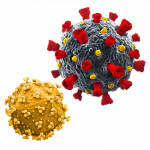The antidepressant Paxil (paroxetine) led to moderate improvements in decision-making and reaction time, and also reduced inflammation among people with HIV-related neurocognitive dysfunction in a small trial. Researchers enrolled 45 HIV-positive people with cognitive impairment in a 24-week placebo-controlled study. Findings were presented at the 2016 Conference on Retroviruses and Opportunistic Infections (CROI) in Boston.
Individuals could only participate in the study if they had not taken a selective-serotonin reuptake inhibitor (SSRI, the class of antidepressants to which Paxil belongs) during the month prior to starting the study.
The participants received either 20 milligrams daily of Paxil, 100 mg twice daily of the antifungal Diflucan (fluconazole), the same doses of both drugs, or placebos.
Both Paxil and Diflucan proved safe in combination with antiretrovirals.
Those taking Paxil, with or without Diflucan, improved their NPZ8 test scores, a measure of psychomotor and motor speed performance and decision-making, by an average of 0.15 points. Those who did not take Paxil saw their score drop by 0.33.
Between the start of the trial and week 24 of treatment, those taking Paxil improved their scores on a reaction-time test, the California Computerized Assessment Package, by 0.5 points, while those who did not take the drug essentially saw no change.
Blood samples taken at the study’s outset and after 24 weeks of treatment showed that Paxil reduced levels of CD163 protein, which tends to be higher in those with HIV-associated neurocognitive disorders and which is a sign of inflammation. At the beginning of the study, the participants had an average of 802 nanograms per milliliters of CD163 in their blood. After Paxil treatment, that level dropped to 738 ng per ml. Those who did not take Paxil experienced an average rise in CD163 levels of almost 400 ng per ml.
To read the conference abstract, click here.
To read a press release about the study, click here.







Comments
Comments